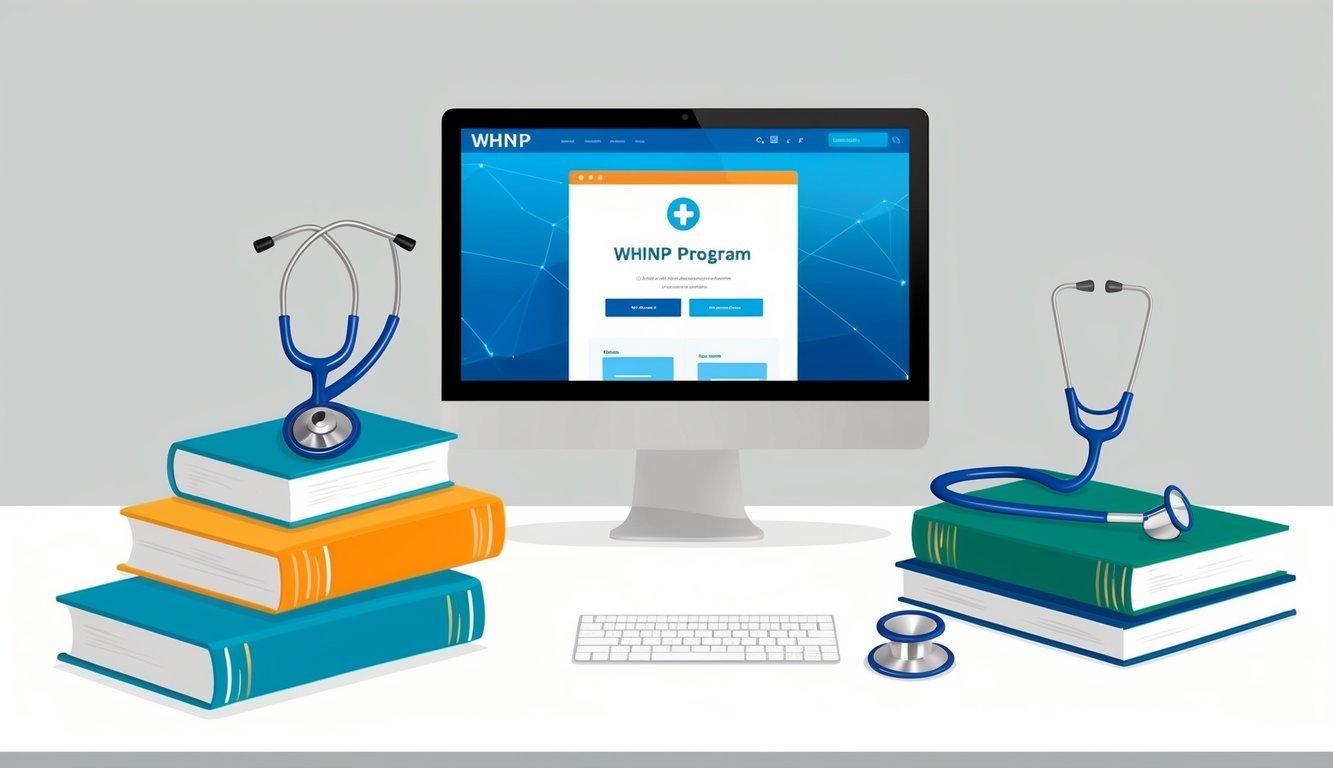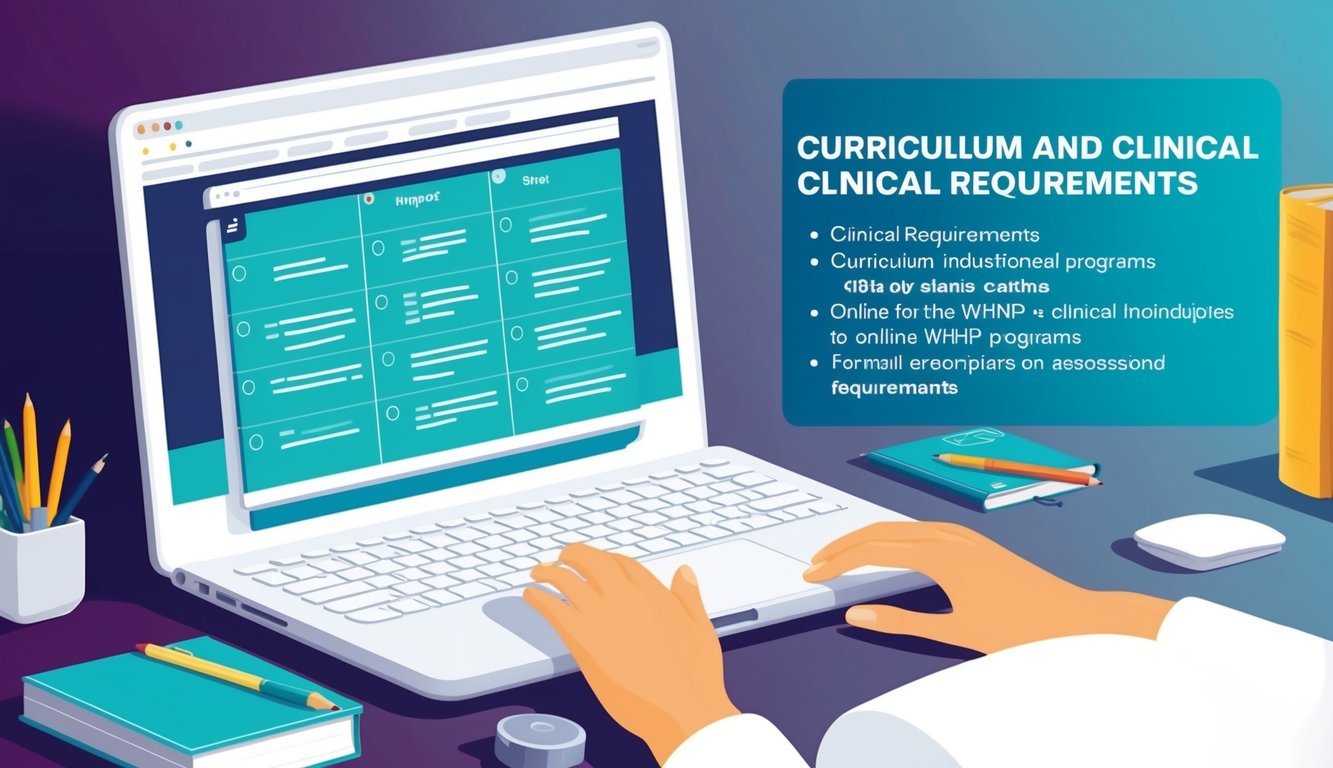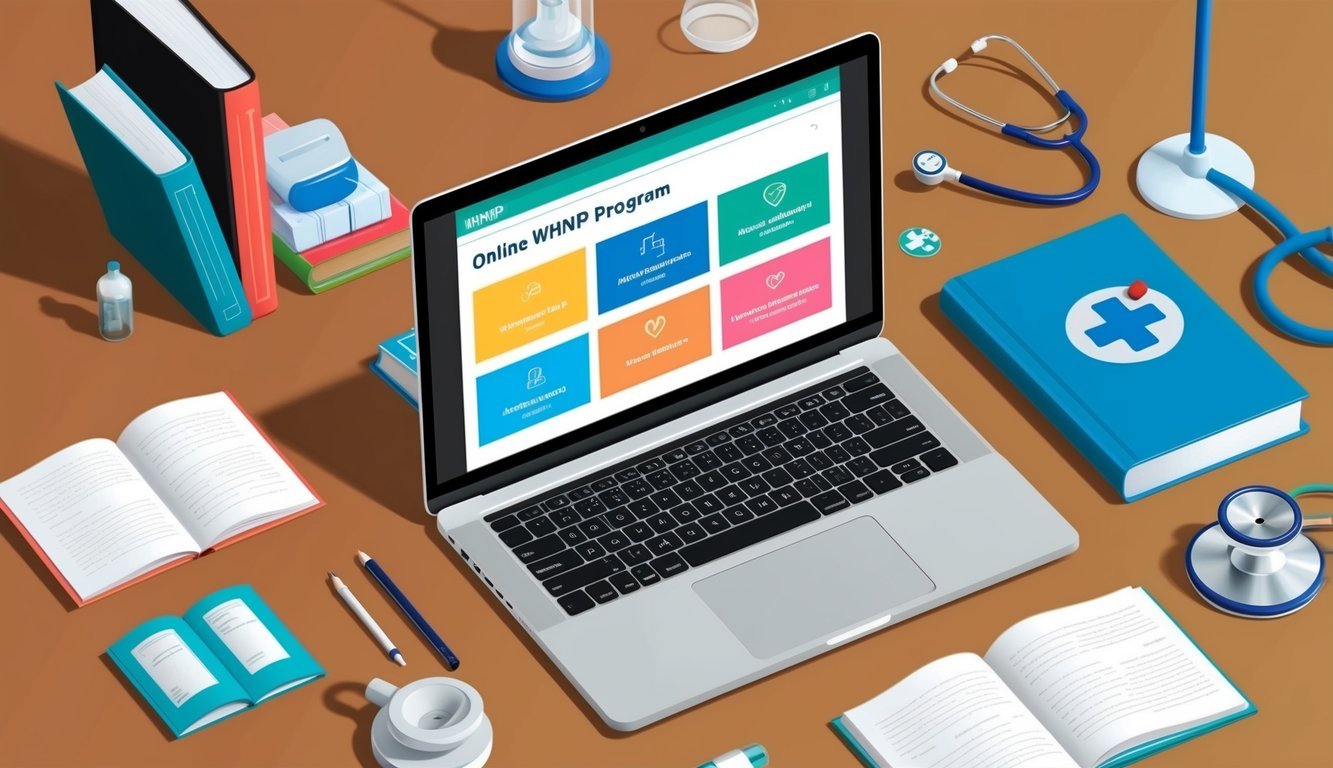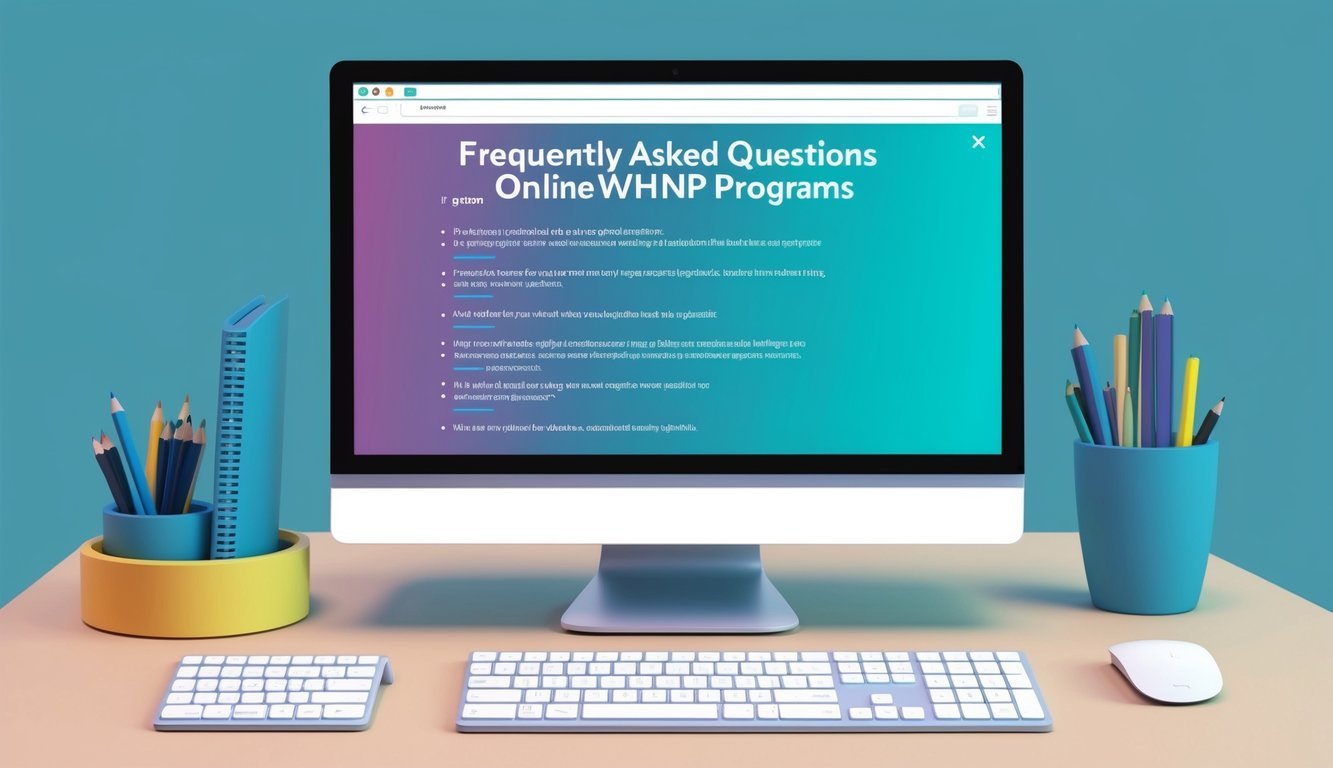Online Women’s Health Nurse Practitioner (WHNP) programs offer a valuable opportunity for registered nurses to advance their education while specializing in women’s health care.
These programs allow you to gain the skills and knowledge needed to provide comprehensive care to women throughout their lives.
This makes them a crucial step for those interested in this fulfilling field.
With the growing demand for health care providers who understand women’s unique needs, pursuing a WHNP program online can be both timely and beneficial for your nursing career.
As you explore these online options, you’ll find various institutions offering flexible curriculums designed to fit into your busy schedule.
Many programs provide support throughout your educational journey, from academic advisers to online resources, ensuring you have the tools you need to succeed.
The tuition costs for these programs can vary, which makes researching financial considerations an important part of your decision-making process.
Transitioning to a role as a Women’s Health Nurse Practitioner can open doors to new career paths and make a meaningful impact in your community.
By focusing on online WHNP programs, you can enhance your skills and contribute to an essential area of health care.
Key Takeaways
- Online WHNP programs cater to registered nurses seeking to specialize in women’s health.
- Flexible learning environments support your education while balancing work and life.
- Understanding tuition costs and financial aid options is crucial for prospective students.
Online WHNP Program Overview

Pursuing an online Women’s Health Nurse Practitioner (WHNP) program can provide you with a flexible path to advancement in nursing.
Understanding the key aspects of these programs will help you make an informed decision about your education and career.
Accreditation and Recognition
Accreditation is crucial for ensuring the quality of your education.
Look for programs accredited by recognized organizations such as the Commission on Collegiate Nursing Education (CCNE) or the Accreditation Commission for Education in Nursing (ACEN).
Accredited programs meet national standards and are more likely to be respected by employers.
Choosing an accredited program also helps you qualify for federal financial aid and licensure.
Completing a program without proper accreditation may affect your ability to work as a WHNP.
Program Length and Structure
Online WHNP programs vary in length and structure, depending on whether you pursue a Master of Science in Nursing (MSN) or a Doctor of Nursing Practice (DNP).
Generally, MSN programs take about 2-3 years to complete, while DNP programs may take 3-4 years.
Most programs consist of core coursework, clinical experiences, and a final capstone project.
Courses may cover topics such as:
- Women’s health
- Family health
- Advanced clinical assessment
Online formats often provide flexibility with asynchronous classes, enabling you to study at your convenience.
Admissions Requirements
Admission requirements can differ by program.
Typically, you’ll need a BSN or an associate degree in nursing, along with a valid RN license.
Additional requirements may include:
- GPA: Many programs require a minimum GPA of 3.0.
- Prerequisite Courses: You may need to complete specific courses before applying.
- Personal Statement: A written statement explaining your goals and motivation often is required.
- References: Most programs ask for professional or academic references.
Be sure to check each program’s specific requirements for a smooth application process.
Curriculum and Clinical Requirements

When pursuing an online Women’s Health Nurse Practitioner (WHNP) program, you will encounter rigorous curriculum demands and clinical requirements essential for your training.
The courses and hands-on experiences will equip you with the skills needed to provide effective care in women’s health.
Core Coursework
The core coursework in a WHNP program typically covers a range of essential topics.
You will study clinical courses such as reproductive health, primary care, and postpartum care.
The curriculum also emphasizes evidence-based research to support decision-making in practice.
Here are some common subjects you can expect:
| Course Title | Description |
|---|---|
| Advanced Health Assessment | Focuses on comprehensive health evaluations. |
| Pathophysiology | Covers the study of disease mechanisms. |
| Pharmacology | Teaches medication management and therapies. |
| Women’s Health Issues | Addresses specific concerns in women’s health. |
This foundational knowledge prepares you for clinical training and enhances your skills as a healthcare provider.
Clinical Skills and Experience
In WHNP programs, clinical skills and experience are crucial.
Students are required to complete between 500 and 700 clinical hours to meet NP licensure standards.
For doctorate programs, this can exceed 1,000 clinical hours.
During your clinical training, you will gain hands-on experience in various settings, such as:
- Obstetrics
- Fertility clinics
- Reproductive healthcare centers
You will hone essential clinical skills like patient assessment, diagnosis, and treatment planning.
This experience helps build confidence and proficiency, allowing you to deliver quality care upon certification.
Specialized Training in Women’s Health
Specialized training focuses on unique aspects of women’s health.
Programs often include specialized courses that address issues such as:
- Menopause management
- Family planning
- Maternal-fetal health
This training is supported by guidelines from the National Certification Corporation, which establishes competencies for certification.
Participating in specialized trainings will prepare you to manage complex health issues affecting women.
This knowledge is vital for promoting overall well-being and addressing specific health needs throughout a woman’s life.
Online Learning Environment and Support
In an online WHNP program, the learning environment prioritizes flexibility, accessibility, and support.
These key elements are crucial for your success, enabling you to balance your studies with personal and professional commitments.
Flexibility and Accessibility
One of the standout features of online WHNP programs is their flexibility.
You can choose when and where to study, which is especially helpful for working nurses.
Most programs allow you to access course materials at any time.
This means you can adapt your learning schedule around your clinical placements or family obligations.
For instance, many online graduate nursing programs offer asynchronous courses, letting you complete assignments on your own timeline.
This flexibility can significantly reduce stress, making it easier for you to focus on your education.
Technology Integration
Technology plays a vital role in the online learning environment.
Programs often use various digital platforms to enhance your learning experience.
These platforms can include learning management systems, online forums, and virtual classrooms.
For instance, some online nurse practitioner programs utilize video conferencing tools for live discussions and lectures.
This technology fosters engagement and allows for real-time interaction with professors and peers.
Additionally, many programs incorporate simulation labs, which let you practice clinical skills in a virtual setting.
This integration ensures you develop the necessary competencies before entering real-world clinical placements.
Student Resources
Support services are essential for your success in an online WHNP program.
Many institutions provide a range of resources, such as tutoring, academic advising, and mental health support.
You can also find assistance with technology, helping you navigate any digital tools required for your courses.
Moreover, libraries and writing centers are often available online, offering you access to research materials and writing help when needed.
Participating in student organizations and online communities can also enhance your learning experience by connecting you with fellow students.
This network can provide guidance and support as you progress through your program.
Attention to these aspects creates a well-rounded online learning environment that supports your academic and professional development.
Tuition and Financial Considerations

When looking into online WHNP programs, understanding tuition costs and financial aid options is essential.
These factors can significantly affect your ability to pursue your educational goals without causing financial strain.
Cost of Online Programs
Tuition for online WHNP programs can vary widely based on the school and program type.
Here’s a general idea of what you might expect:
| University | Tuition per Credit Hour |
|---|---|
| Duke University | $1,984 |
| University of Alabama at Birmingham | $682 |
| University of Minnesota | $973.75 |
Most programs fall within the range of $500 to $1,000 per credit.
Additionally, some institutions offer BSN to DNP programs that may have different pricing structures, so it’s vital to check each program’s specific details.
Remember to factor in other costs such as books, technology fees, and clinical requirements when budgeting.
Financial Aid and Scholarships
Many students qualify for financial assistance, which can help reduce your overall costs. Financial aid options include federal loans, grants, and scholarships.
You should complete the Free Application for Federal Student Aid (FAFSA) to see what you may qualify for.
Some scholarships are specifically aimed at nursing students or those enrolled in WHNP programs.
Consider looking at scholarships offered by universities or nursing organizations.
Funding sources may cover tuition and additional expenses, making your education more affordable.
Checking resources like NursingProcess.org can also provide insight into scholarships available for online WHNP programs.
Institutions Offering Online WHNP Programs

When considering online Women’s Health Nurse Practitioner (WHNP) programs, you have various respected institutions to choose from.
Each offers unique benefits, including flexible schedules, diverse courses, and strong support for students.
Top Rated Nursing Schools
Several top-rated nursing schools offer online WHNP programs that are well-regarded in the field.
Here are some key options:
| University | Program Notes |
|---|---|
| Frontier Nursing University | Known for its emphasis on rural health care. |
| Duke University | Offers a comprehensive curriculum with clinical opportunities. |
| Georgetown University | Focuses on women’s health and community nursing. |
| University of Pennsylvania | Provides a strong research-based curriculum. |
| Vanderbilt University | Integrates clinical practice with theoretical knowledge. |
| Emory University | Offers a holistic approach to women’s health. |
These institutions prioritize quality education and often have strong networks in the healthcare community, enhancing your job prospects after graduation.
Diverse Program Offerings
Different universities provide a variety of program formats and specialties within WHNP education.
For example, Regis College features an online DNP with a focus on women’s health, catering to students aiming for advanced practice roles.
The University of Alabama at Birmingham and the University of Cincinnati both offer online programs that combine accessible coursework with in-person clinical options, making it easier to gain practical experience.
Thomas Jefferson University and Loyola University Chicago present diverse elective options, allowing you to tailor your education.
Yale University is noted for its innovative approaches to nursing education, ensuring that graduates are well-prepared for today’s healthcare challenges.
These programs help you develop essential skills to provide high-quality care in women’s health settings.
Frequently Asked Questions

This section addresses common questions regarding online Women’s Health Nurse Practitioner (WHNP) programs.
Topics include admission requirements, program quality, costs, state-specific requirements, career scope, and curriculum differences.
What are the admission requirements for accredited online WHNP programs?
To enroll in an accredited online WHNP program, you typically need a valid registered nurse (RN) license.
Most programs also require a Bachelor of Science in Nursing (BSN) or an equivalent degree.
Additionally, schools may ask for letters of recommendation, a personal statement, and evidence of clinical experience.
Which universities offer the best online WHNP programs recognized for their quality education?
Several universities are known for their high-quality online WHNP programs.
Institutions like Georgetown University and the University of Cincinnati offer respected programs.
You can check NursingProcess.org for a list of top-ranked programs.
How does the cost of online WHNP programs compare across different institutions?
Tuition costs for online WHNP programs vary significantly.
Most schools charge between $500 and $1,000 per credit.
For example, the University of Minnesota charges approximately $973.75 per credit.
It’s important to research each program’s tuition rates and any additional fees.
Are there specific state requirements for online Women’s Health Nurse Practitioner programs in states like Florida, New York, and Texas?
Yes, state requirements can differ.
In Florida, WHNPs must complete specific clinical hours.
New York has unique licensing rules that impact practice authority.
Meanwhile, Texas requires WHNPs to have national certification.
Check your state board of nursing for precise requirements.
What is the career scope and practice authority for WHNPs in various states?
The career scope for WHNPs is expanding.
In many states, you can diagnose and treat women’s health issues.
Some states grant full practice authority, allowing you to work independently.
Others may have supervisory requirements.
Research your state’s laws for specific practice authority.
How does the curriculum for a Women’s Health Nurse Practitioner program differ from a Family Nurse Practitioner program?
WHNP programs focus specifically on women’s health, covering topics like reproductive health and maternity care.
FNP programs have a broader scope, addressing health for all ages.
Reviewing the curriculum details can help you decide which path is right for you.

